Known as quick-connect, push-on or push-fit, these breakthrough plumbing products are often at the center of plucky online debates. Since entering the U.S. plumbing market in 2004, the design and technology of push-to-connect fittings have revolutionized the industry as a quick, reliable, tool-free solution for connecting small potable water pipes. Driven by feedback from plumbers Read more
RWC

Known as quick-connect, push-on or push-fit, these breakthrough plumbing products are often at the center of plucky online debates. Since entering the U.S. plumbing market in 2004, the design and technology of push-to-connect fittings have revolutionized the industry as a quick, reliable, tool-free solution for connecting small potable water pipes. Driven by feedback from plumbers, this product class has evolved robust designs made of materials like rubber, silicon, brass and stainless steel, incorporating key components such as o-ring seals and gripping mechanisms.
But are they best used only as a temporary fix as some users claim, or can you count on them for a variety of long-term uses? We let the facts flow freely so you can make an informed decision on whether to give these fittings a try.
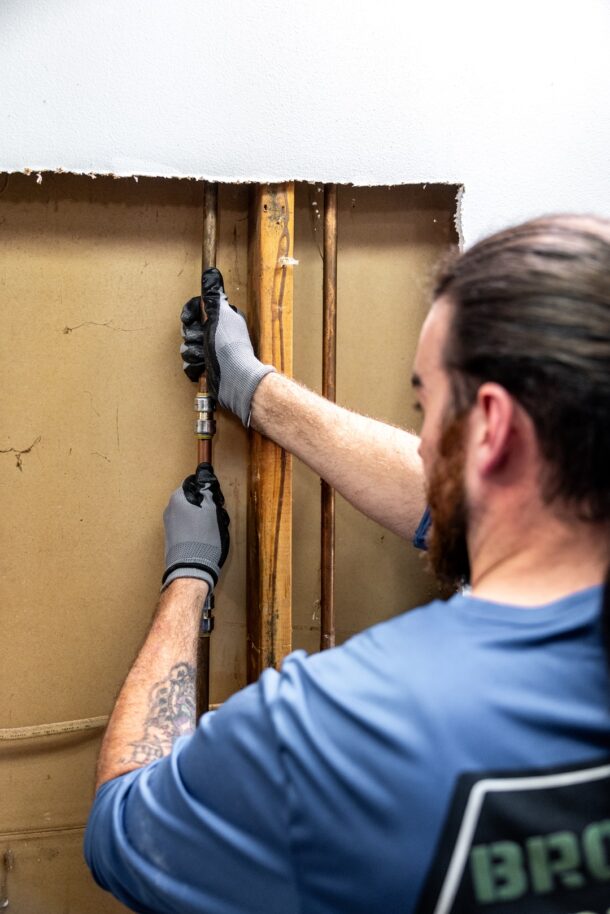
Rapid Adoption and Evolution
Two decades of innovation have made push-to-connect fittings indispensable for applications ranging from residential plumbing to advanced manufacturing. The most common uses are in residential service and repair, including some new builds. They went through a lead-free transition to newer models that are stronger and more durable, accelerating adoption further.
The American-made SharkBite Max model sets the industry standard with a stainless-steel retainer around the outside and a pressure rating of 250 psi. This doubled the burst pressure limit of the original model, the most popular push-to-connect fitting. A deeper insertion depth allows the new model’s steel teeth to engage the pipe more effectively, creating a stronger connection that eliminates the need for an interior tube liner.
Primary Benefits and Advantages of Push-to-Connect Fittings
Using push-on fittings means shorter installation times, fewer errors to correct, and easy, versatile disconnections and reconfigurations. No soldering, crimping, glue or special tools are needed for installation. Unlike conventional approaches, the pipe doesn’t need to be dry before making a connection. Water can be pouring out of a pipe and these fittings can still be quickly connected without a tool, even in a tight space, making them an excellent option for pipe repairs.
Knowing leaks and pipe aging are inevitable, it’s a good practice to keep some push-fit fittings handy. If it’s a failed joint pinhole leak, a push-to-connect fitting can be a fast, reliable and inexpensive solution, especially in areas where pipes are prone to freezing and bursting.
Other strengths of today’s push-fit models include:
- Perfect for transitioning between pipe materials, including copper, PVC, PEX, CPVC, PE-RT and HDPE (SDR-9)
- Fitting rotates around the pipe even after it’s connected
- Strong manufacturer warranties (SharkBite Max warranty is 25 years)
- Code approved to be buried underground (when wrapped in silicone tape) or installed behind walls
- Compliant with all regulatory changes
The simplicity and efficiency of push fittings have streamlined a handful of core plumbing tasks and even helped address labor shortages by making it easier to get new plumbers out in the field performing repairs quickly. They’ve also made basic and emergency plumbing repairs accessible to DIYers. However, despite their versatility, they’re not ideal for every situation.
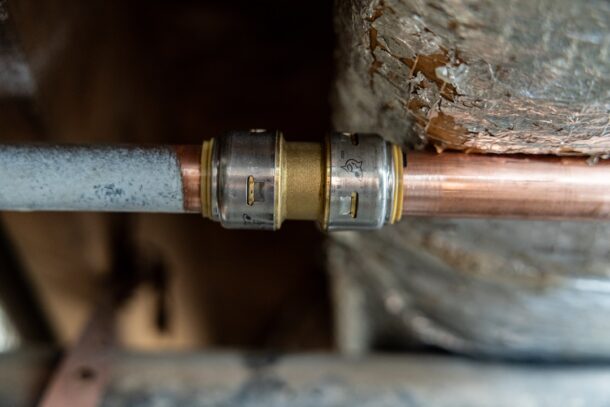
Drawbacks, Limitations and Criticisms
Push fittings must be used in the right way to capitalize on their advantages. In the rare case when there’s a problem, installing them improperly or in a spot they’re not designed for is almost always the cause. By keeping a few points in mind, you can make the right decision every time on when and where to use them.
Here are the main things to consider for a smooth experience:
Initial Cost: The best push-to-connect fittings can be a bit pricier than soldering or crimping. You’ll save big on labor installing them faster, but the upfront cost per fitting can be higher.
Compatibility Limits: While leading push-fit fittings are compatible with almost all pipe types, they don’t work with everything, like galvanized steel or flexible hoses. And they still require specific fittings for certain transitions, like polybutylene to CTS tubing. This adds a step to some jobs and possibly to inventory management.
Not for All Applications: Standard push fittings are certified for potable water and radiant heating installations, limiting their use in industrial plumbing. Exceeding the certified limits (250 psi and 200°F for Max fittings) can lead to failures, so they’re not suitable for all high-pressure or high-temperature applications.
Designed for Single Use: While push-to-connect fittings can be removed if you need to adjust or test, they’re not designed to be reused multiple times in permanent installations. The integrity of the seal may be compromised with repeated removal and reinsertion.
Spotting Leaks: All push-to-connect fittings rely on o-rings for sealing. If the fitting isn’t installed correctly — such as failing to deburr the pipe — or gets jarred out of place inadvertently, the o-ring can get damaged, potentially leading to leaks. Although rare, leaks inside the fitting can be tougher to spot, so they might not be noticed immediately.
You’re best off choosing manufacturers that are transparent about the materials they use in their fittings, especially the o-rings since they keep the seal. For example, SharkBite Max o-rings are made of a specific type of rubber called EPDM (Ethylene Propylene Diene Monomer), chosen for its durability, flexibility and chemical resistance:
- EPDM is known for its resistance to aging and degradation, making it suitable for long-term plumbing applications
- It maintains its flexibility even at lower temperatures, ensuring a good seal
- EPDM is specifically selected for its resistance to chloramine, a disinfectant chemical often added to municipal water
Of these concerns, leaks are the most hotly debated. Some professionals still hesitate to use push-to-connect fittings behind walls because of concerns about long-term reliability and potential hidden leaks. But after two decades of continuous improvement and in-wall use by plumbers in homes and other buildings across America, these isolated instances can always be traced back to user error. Common causes of fitting failure include:
- Pipe that is unevenly cut, not deburred or not free of debris, potentially preventing a secure seal
- Using the wrong fitting for the wrong application
- Not marking the insertion depth to ensure that you pushed the pipe all the way into the fitting
- Not wrapping fittings in silicone tape that protects it from soil contaminants
- Rough or repeated disconnection
When it comes to quality, the widespread adoption of push-to-connect fittings speaks for itself. But don’t take anyone’s word for it. Test them out for yourself and you’ll see why they’ve become so popular with pros everywhere.
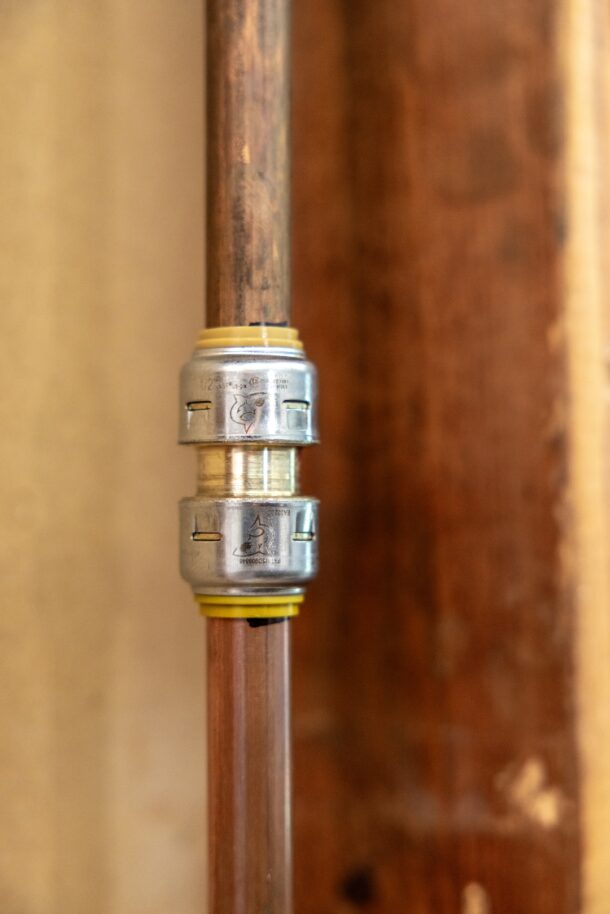
Plumbers Shape the Evolution of Push-to-Connect Technology
You can play a role in shaping this product’s evolution by sharing your thoughts and experiences directly with manufacturers. The best way to help drive the evolution of plumbing technology is for plumbers of all skill levels to share and connect online—post product reviews and reach out with comments and questions on social media or through company websites. Equipment manufacturers can serve you best when they hear from you often, and the most innovative tend to be more responsive to feedback.
Some manufacturers have employees who will share free resources like training materials and demonstrations to help plumbers integrate their game-changing products. If you ask nicely, they might even send someone to walk the job site with you when they can. Dropping the company a line on your favorite social channel is a great way to make another connection that’s built to last.
Written by Matt Glenn, senior product manager at RWC, a market leader and manufacturer of water control systems and plumbing solutions for residential, commercial and industrial applications.
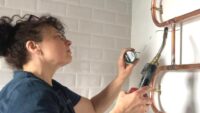
SharkBite Forges a Powerful New Collaboration with Women in Plumbing & Piping (WiPP) In a move that underscores its commitment to diversity and innovation, SharkBite has entered a seminal partnership with Women in Plumbing & Piping (WiPP). SharkBite’s latest venture into progressive plumbing partnerships heralds a concerted effort to reshape the plumbing industry’s landscape, emphasizing Read more
SharkBite Forges a Powerful New Collaboration with Women in Plumbing & Piping (WiPP)
In a move that underscores its commitment to diversity and innovation, SharkBite has entered a seminal partnership with Women in Plumbing & Piping (WiPP). SharkBite’s latest venture into progressive plumbing partnerships heralds a concerted effort to reshape the plumbing industry’s landscape, emphasizing the critical role of women in its collective future.
Women in Plumbing & Piping has publicly embraced a synergistic relationship with SharkBite, a brand at the vanguard of plumbing innovation. As a founding sponsor of the organization, SharkBite’s new alliance with WiPP exemplifies a shared resolve to foster inclusivity and diversity within the plumbing and piping sectors, especially when it comes to gender.
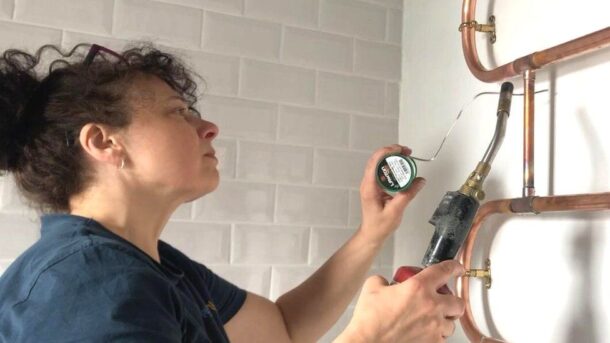
With an eye toward the future, WiPP and SharkBite envision 2024 as a springboard for engendering new prospects for plumbing enterprises and aspiring women in this essential and financially rewarding trade, which is brimming with opportunities for progression and specialization.
“At this juncture, our engagement with Women in Plumbing & Piping marks a pivotal chapter in our journey,” stated Chris Carrier, senior director of marketing at Reliance Worldwide Corporation (RWC), where SharkBite is a leading brand and business unit. “Considering the current representation of women, a mere 1.1%, in the plumbing workforce, it is crucial that we champion the cause of women’s empowerment and their advancement on a national scale. Our collaboration with WiPP is not just an industry investment; it’s also a stepping stone for women already within the trade to prosper and excel in their careers.”
WiPP’s four foundational tenets—Mentorship, Education, Recognition, and Networking—provide the infrastructure to profoundly influence the professional lives of countless women in plumbing and piping.
Kim Gill, the Executive Director of WiPP, expressed her enthusiasm. “We are delighted to welcome SharkBite as a sponsor of WiPP. Their commitment to plumbing innovation aligns seamlessly with our mission to bring the plumbing and piping industries to new levels of excellence,” said Gill. “Together, we will continue to address workforce shortages, empower women and drive positive change.”
The partnerships WiPP forges are steeped in mutual trust, transparency, and a dedication to shared objectives, fueling expansion and outreach to a variety of communities.
Strategic Alliance with WiPP Spearheads Empowerment and Industry Excellence
A relatively new and already impactful player in the U.S. plumbing arena, established in 2022, Women in Plumbing & Piping is a nonprofit entity, conceived by forward-thinking women committed to cultivating a dynamic community for their peers in the industry. WiPP champions the vital contributions of women, acknowledging their role as an integral force in sculpting the trades’ future. Based in suburban Denver, Colorado, more information on membership benefits can be found at womeninplumbandpipe.org.
To explore partnership opportunities, visit: WIPP Parternship Opportunities.
SharkBite stands as an exemplar of ingenuity, making them an ideal ally in the crusade to empower women in plumbing. Together with Reliance Worldwide Corporation, SharkBite is a beacon of innovative push-to-connect plumbing solutions globally, including the venerated SharkBite Max product line.
For over twenty years, SharkBite has spearheaded the development of products that address industry challenges and arm plumbing professionals with the means to enhance productivity and efficiency. Leading the charge in push-to-connect plumbing technologies, SharkBite’s team adeptly caters to a breadth of applications ranging from residential and commercial construction to complex industrial projects of all scales.
SharkBite’s proven product suite streamlines installations by eliminating the need for specialized tools or complicated procedures, reducing the margin for error. Their comprehensive system encompasses an array of fittings, pipes and accessories indispensable for constructing a potable water system.
As a cornerstone of the RWC brand portfolio, SharkBite is instrumental in sustaining RWC’s esteemed global reputation as an innovator and manufacturer of water control systems and plumbing solutions for a myriad of applications.

By sharing Starr Delgado’s, Kim Yeagley’s and Anna Pearson’s stories, RWC aims to highlight more diverse perspectives in plumbing. Reliance Worldwide Corporation (RWC) is a leading manufacturer of premium branded plumbing products, valves, secondary pipe supports, fire-stopping solutions, DWV testing and fluid control technologies for residential and commercial applications. Women in Construction (WIC) Week, originally founded Read more
By sharing Starr Delgado’s, Kim Yeagley’s and Anna Pearson’s stories, RWC aims to highlight more diverse perspectives in plumbing.
Reliance Worldwide Corporation (RWC) is a leading manufacturer of premium branded plumbing products, valves, secondary pipe supports, fire-stopping solutions, DWV testing and fluid control technologies for residential and commercial applications.
Women in Construction (WIC) Week, originally founded in 1953 by the National Association of Women in Construction (NAWIC), was created to support women working in the industry. The week has grown over the years, successfully amplifying women’s voices to the point where many construction and manufacturing companies have also turned their attention to celebrating and supporting women in the trade. RWC is one of them.
“By supporting women in construction, we can create a more inclusive industry and attract new talent to fulfill the increasing number of open positions within the trades,” said Emily Connell, Director of Brand Marketing & Communications for RWC Americas. “RWC and its family of brands understand the importance of supporting diverse talent, including women, especially within the plumbing trade.”
Plumbing professionals, such as Starr Delgado, Kim Yeagley and Anna Pearson, have been overcoming plumber stereotypes for years. Emily Connell
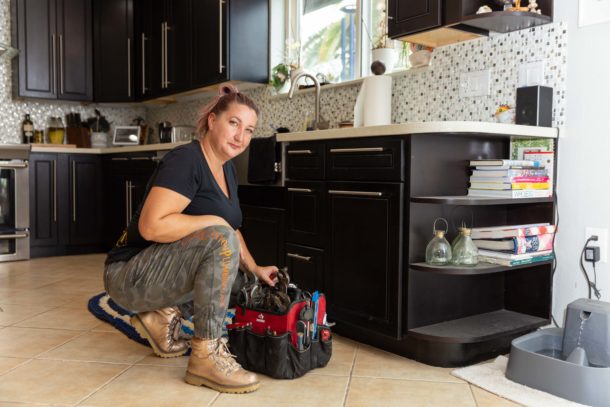
Yeagley, the owner of Gold Canyon Plumbing in Arizona, has been in plumbing for 15 years.
“At first, I wasn’t sure how guys were going to accept me,” she said. “People doubt that I know my plumbing, but once I start talking shop, that’s how I win everyone over.”

Pearson, a plumbing apprentice at A-Better Plumbing in Las Vegas, wants to show the world that plumbers are all sorts of different people from various walks of life. To help demonstrate that, she uses her social media platforms, where she’s affectionately known as the Plumbing Princess, to document her journey and promote the plumbing trade.
“Genuinely, I want people to join the trades,” Pearson said. “I want it to be a growing industry again.”
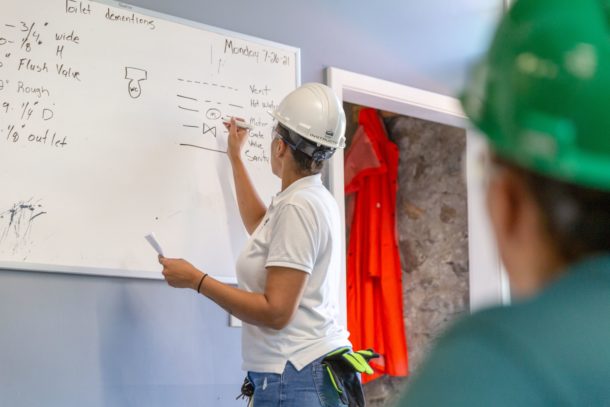
Delgado, a plumbing instructor at HBI Job Corps Plumbing Program in North Grafton, Massachusetts, offered advice to women looking to enter the trades.
“There’s always going to be challenges for women in the field,” she said. “People are always going to say, you can’t, you shouldn’t or don’t, but if you say, ‘I’m going to, I can and I will’ and stay focused, you can do it. You just have to have some thick skin. Being a plumber is an amazing career to be in.”
RWC is doing its part to support women in plumbing by showcasing their talent and sharing their stories. The company plans to continue sharing similar stories to reach and inform the younger generation and diverse talent pools, in hopes that they begin to see the opportunities of pursuing a career in the trades.
“We will keep supporting women in plumbing by giving them a platform to share their stories,” Connell added. “We need to hit the labor shortage head-on, and we can do so by ensuring everyone feels welcome in the trades and by defeating common stereotypes associated with plumbers. Part of achieving that includes telling authentic stories, changing people’s perception of the trade and helping to create a more inclusive environment.”

A female plumber’s tale sheds light on the fulfilling career to be had in the trades As Careers in Construction Month draws to a close, Reliance Worldwide Corporation (RWC) is committed to continuing its investment in the national initiative, which recognizes talent and career development opportunities throughout the building trades. Designed to engage prospective skilled laborers as Read more
A female plumber’s tale sheds light on the fulfilling career to be had in the trades
As Careers in Construction Month draws to a close, Reliance Worldwide Corporation (RWC) is committed to continuing its investment in the national initiative, which recognizes talent and career development opportunities throughout the building trades. Designed to engage prospective skilled laborers as well as current professionals, RWC remains focused on inspiring others to seek a career in the trades.
With a well-documented passion for this initiative – including its national partnership with the Home Builders Institute (HBI) which was announced at IBS 2021 – RWC has a continuous drive to learn as much as possible to help increase the talent pool. After recent participation in HBI’s Industry Workforce Roundtable, the biggest takeaway was clear: an undeniable need for increased industry diversity.
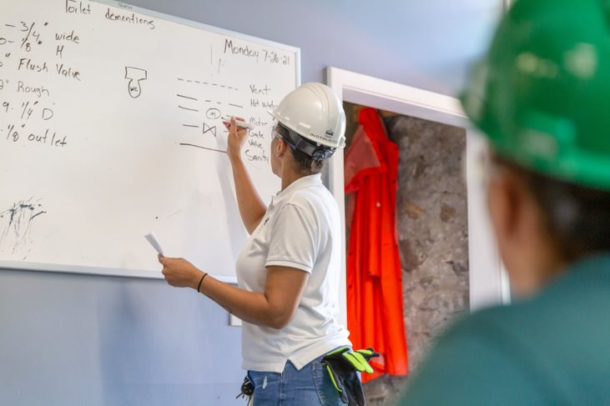
In a category with unfulfilled positions and untapped opportunities, RWC is doing its part to help by identifying and showcasing diverse talent, sharing their stories to inform and inspire others to start their career in plumbing. And through the partnership with HBI, RWC met Starr Delgado, a certified plumber and plumbing instructor at HBI’s Job Corps Plumbing Program.
Overcoming personal and professional challenges – including dropping out of school – led Delgado to pursue a career that could help to support her family. After researching career paths and identifying plumbing as the ultimate solution, Delgado began taking plumbing courses at HBI and was inspired by her plumbing instructor to come back years later to teach. Today, she owns her own home, her own car and supports her family through her plumbing career.
“The most rewarding thing for me is the students,” said Delgado. “You get to give back…the hardest of the hardest kids come through these doors, and they turn out to be something amazing.”
When asked about her experiences as an industry-leading woman and the advice she would give to others, she stated, “There’s always going to be challenges for women in the field. People are always going to say you can’t or you shouldn’t or don’t. But if you say I’m going to, I can and I will, you can do it. You just have to have some thick skin.”
By breaking through the stereotypes associated with plumbers, Delgado was able to achieve all that she wanted: the ability to support her family and a career she could be proud of. RWC plans to continue sharing similar stories to reach the younger generation, as well as diverse groups, in the hopes that they begin seeing the opportunities that could be had by pursuing a career in the trades.

John Guest, part of the Reliance Worldwide Corporation family of brands, turns 60 in 2021, celebrating a long history of delivering advanced plumbing technology, quality products and innovative solutions to a diverse range of industries. Over the years, John Guest’s push-fit plumbing products have paved the way for better drink dispense, water filtration, air and pneumatics, telecoms Read more
John Guest, part of the Reliance Worldwide Corporation family of brands, turns 60 in 2021, celebrating a long history of delivering advanced plumbing technology, quality products and innovative solutions to a diverse range of industries. Over the years, John Guest’s push-fit plumbing products have paved the way for better drink dispense, water filtration, air and pneumatics, telecoms, automotive and OEM solutions.
“With more than 1 billion fittings installed and in use worldwide, John Guest is a leader in the plastic push-to-connect category,” said Ted Antony, fluid tech marketing specialist at RWC. “OEMs choose us because we’re known for providing reliable products, offering strong process controls, meticulous testing and adherence to required approvals.”
The company’s founder, John Guest, was determined to run a company where quality of product and excellence of service was ingrained in its culture. From the company’s start in the 1960s, he encouraged a strong spirit of innovation, which led to the invention of the first push-fit connection in the 1970s by Guest himself. This technology, later known as Speedfit, made connections quicker, easier and more reliable than ever. Since then, the push-fit fittings have been developed for a wide range of applications.
To continue Guest’s legacy of producing reliable products and excellent service, the company maintains strict control over its entire engineering and manufacturing process, ensuring only products of the highest quality are produced. The company manages the product’s entire journey from its initial concept, to tool design and construction, to product manufacturing and finally assembly and testing.
“All of our fittings share precision engineering, a feature for which John Guest is renowned,” Antony said. “Whether you’re drinking a glass of water, getting your teeth cleaned at the dentist or getting your car washed, you’ve probably already experienced our products.”
60 years of maintaining customer satisfaction and providing high-quality solutions makes John Guest one of the top options for OEMs and installers. Having established and maintained a powerful legacy of anticipating the industry’s future and providing solutions OEMs can stake their reputations on, John Guest continues to serve the industry technology they can trust.
Its parent company, RWC, is also celebrating John Guest’s anniversary this year. After acquiring the brand in 2017, RWC became one of the world’s leading manufacturers of plastic and metal push-fit fittings, pipe and valves.
Learn more about John Guest at johnguestusa.com.
